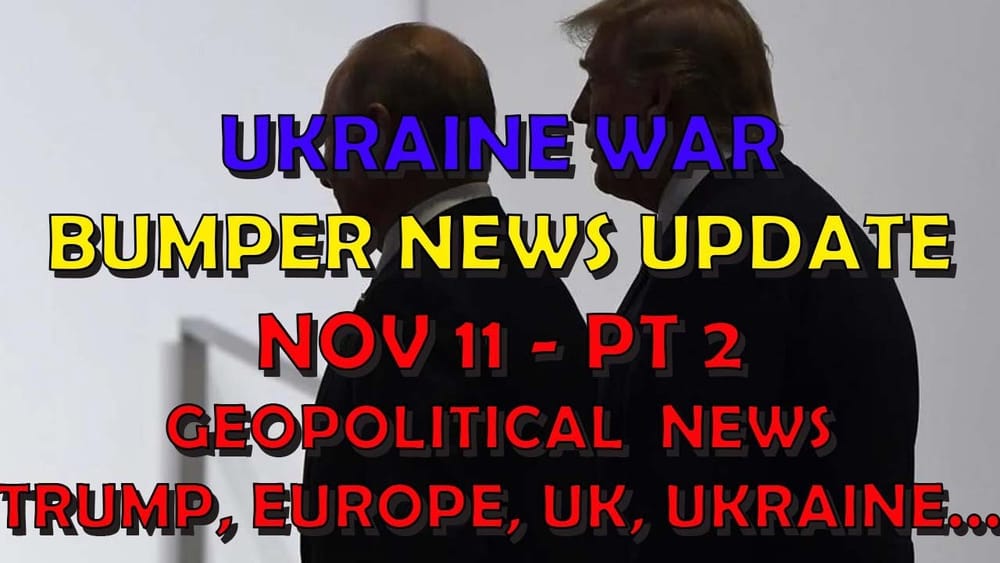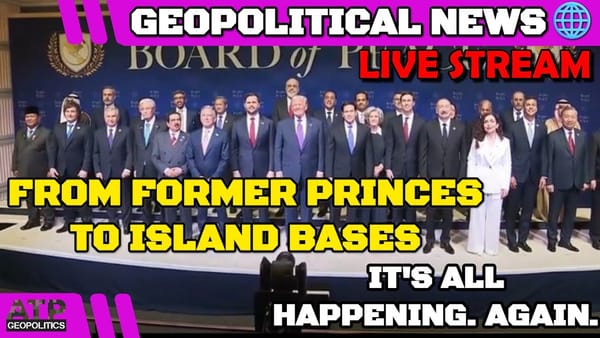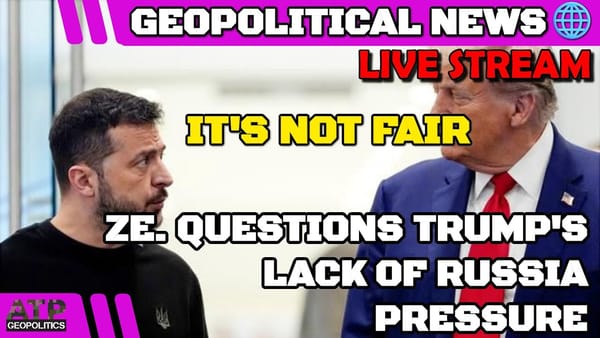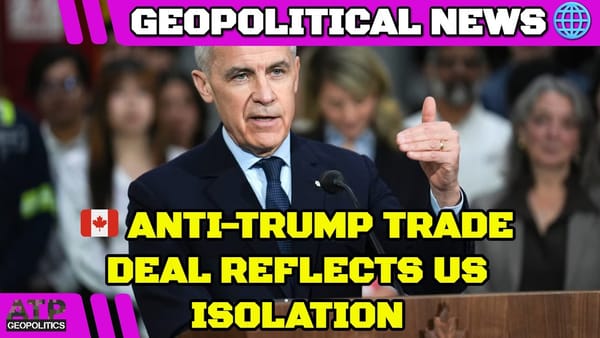Ukraine War Update BUMPER NEWS: Geopolitical News
Table of Contents 📖
"If you are up for free and fair and transparent democracies, what you have coming into the US, into Washington, is as far from that as you could possibly imagine in modern America."
Hello Team
🎦 00:00-00:27⏩
- Jonathan welcomes viewers to the third part of his Ukraine War Update for the 11th of November 2024.
- He will be focusing on military aid and broader geopolitical reactions to the US election, specifically concerning America's role in the conflict.
Ukraine reactions to Trump's election victory
🎦 00:27-01:12⏩
- Jonathan discusses the surprising reaction in Ukraine to Trump's election victory, noting that many were not overly upset.
- He explains that this stems from frustration with the Biden administration's cautious approach and reluctance to escalate, leading to a sense of paralysis in providing Ukraine with needed support.
- There's a belief that Trump's unpredictable nature and potential for bravado could lead to a more decisive stance, even if it risks escalation.
Trump's appointments and Ukraine's concerns
🎦 01:12-02:56⏩
- Jonathan highlights concerns over Trump's appointments, suggesting they do not bode well for Ukraine.
- However, he explores the possibility that Trump's thin-skinned personality could play a role in his interactions with Putin.
- He cites examples of Russian propagandists, like Skavieva, using personal attacks against Trump, such as showing nude photos of Melania Trump.
- Jonathan speculates that these provocations could backfire, pushing Trump to take a stronger stance against Putin and increase support for Ukraine.
Trump's range of potential actions and Ukraine's options
🎦 02:56-05:20⏩
- Jonathan analyses Trump's possible actions, outlining a range from strong support to active opposition towards Ukraine.
- He believes Trump is likely to push for negotiations, potentially cutting off aid, forcing Ukraine to choose between unfavorable peace terms or relying solely on European support.
- He expresses concern that this outcome could undermine Ukraine's chances of success against Russia, especially given their growing losses (620 sq miles) and economic challenges.
US imposing political outcomes on a sovereign nation
🎦 05:20-06:02⏩
- Jonathan critiques the US imposing political outcomes on Ukraine, a sovereign nation.
- He finds it morally unsettling that after being invaded and devastated by Russia, Ukraine could be pressured by its ally (the US) into making peace with the aggressor.
Zelensky's response and potential peace plans
🎦 06:02-07:21⏩
- Jonathan notes Zelensky's quick endorsement of Trump's victory, likely motivated by frustration with Biden's policies.
- He believes Zelensky is trying to mend relations with Trump following a potentially damaging incident during a visit to Pennsylvania in September.
- He outlines two potential peace plans mentioned by The Economist:
- The Vance Plan: Freezes the conflict along current lines and forces Ukrainian neutrality.
- The Pompeo Plan: Increases military support and potentially leads to NATO membership.
- Jonathan argues that the most crucial aspect of any agreement is Ukraine's future security, not just the immediate ceasefire terms.
The Economist's analysis of Ukraine's situation
🎦 07:21-07:51⏩
- Jonathan discusses The Economist's assessment of Ukraine's internal situation, highlighting concerns about:
- Significant territorial losses since 2022.
- Struggles with conscription, infrastructure, migration, and economic production.
- Emerging issues with military morale.
- A potential breakdown of trust between society, the army, and the leadership.
- He disputes the claim of a complete breakdown in civil-military relations, urging caution in interpreting media reports.
Trump's potential demands and Ukraine's vulnerability
🎦 07:51-08:41⏩
- Jonathan speculates that Trump, while unlikely to abandon Ukraine entirely, might leverage aid for transactional benefits, like access to natural resources.
- He believes lingering resentment from Zelensky's Pennsylvania visit could further complicate matters.
- He highlights Trump's persistent focus on resolving the conflict, noting contradictory statements about achieving peace before and after taking office.
- He quotes Jake Sullivan, Biden's National Security Advisor, who argues that abandoning Ukraine would destabilize Europe and urges Congress to support continued aid.
- Jonathan doubts Biden's ability to sway Trump's stance on the issue.
Donald Trump Jr.'s stance on aid to Ukraine
🎦 08:41-09:24⏩
- Jonathan criticizes Donald Trump Jr.'s dismissive attitude towards Ukraine, citing a video where he mocks Zelensky and suggests aid will be cut off under a Trump presidency.
David Sachs and disinformation
🎦 09:24-10:15⏩
- Jonathan fiercely condemns billionaire oligarch David Sachs for spreading disinformation about the war, calling him a "disinformation-riddled knob jockey".
- Sachs argues that the war is a "grift" and that most people in Crimea and Donbas wanted to join Russia, claims that Jonathan strongly refutes.
Trump's rejection of pro-Ukraine figures
🎦 10:15-10:40⏩
- Jonathan notes that both Mike Pompeo and Nikki Haley, known supporters of Ukraine, have been rejected for positions in the Trump administration.
- He interprets this as a deliberate move by Trump to eliminate dissent and enforce strict conformity within his cabinet.
Russia's mixed messages on Trump's election
🎦 10:40-11:52⏩
- Jonathan analyses mixed signals coming from Russia regarding Trump's victory.
- He points out that Peskov, a Kremlin spokesperson, praised Trump and welcomed his stance on the war, which Jonathan views as a sign that Trump's policies benefit Russia.
- He contrasts this with the actions of Russian propagandists like Skavieva, who aired derogatory content about Trump, suggesting a deliberate attempt to test his reactions and manipulate him.
Ukraine denies prior knowledge of Trump-Putin call
🎦 11:52-13:19⏩
- Jonathan discusses a reported phone call between Trump and Putin about the war.
- He highlights Ukraine's strong denial of any prior knowledge or approval of the call, contradicting claims made in the Washington Post.
- This further emphasizes the lack of Ukrainian agency in the decisions being made about their future.
The shift in the Republican Party since 2016
🎦 13:19-14:41⏩
- Jonathan explains that Trump's 2024 victory represents a more powerful mandate for the extreme MAGA wing of the Republican Party.
- Unlike his first victory in 2016, where he was constrained by the existing GOP framework, Trump now has greater control over a party that has largely embraced his populist rhetoric.
- This, he argues, will lead to less nuanced policymaking and a decline in bipartisan support for Ukraine.
Erosion of checks and balances in US government
🎦 14:41-15:55⏩
- Jonathan expresses concern over the erosion of checks and balances within the US government.
- He points to Republican senators readily accepting Trump's demands to expedite appointments and bend Senate rules.
- He warns that this lack of accountability coupled with Trump's autocratic tendencies could have serious consequences for democratic processes.
- He quotes Mike Johnson, the House Speaker, indicating that there's no interest in further funding for Ukraine, suggesting the $61 billion bill recently passed will be the last.
European leaders and appeasement of Russia
🎦 15:55-17:00⏩
- Jonathan criticizes the rise of populist leaders in Europe who seek to appease Russia.
- He cites Robert Fico, the Slovakian leader, who believes Europe should follow the US's lead, regardless of the stance on the war, and anticipates a return to economic ties with Russia after the conflict.
- Jonathan views this as a dangerous trend emboldened by Trump's victory, giving figures like Viktor Orban (Hungary) and Fico license to undermine EU unity and support for Ukraine.
Zelensky considering replacing US ambassador
🎦 17:00-17:45⏩
- Jonathan reports that Zelensky is planning to replace Oksana Makarova, Ukraine's ambassador to the US.
- This comes after pressure from Mike Johnson, who had previously called for her removal following Zelensky's visit to an arms factory in Pennsylvania, which Johnson considered partisan.
- Jonathan also shares Medvedev's earlier prediction that Trump's rhetoric would be ineffective in stopping the war and that attempts to do so could lead to his downfall, likening him to JFK.
Analysis of Europe's reaction to Trump's victory
🎦 17:45-20:35⏩
- Jonathan plays an audio clip of Alistair Campbell (former Tony Blair spin doctor) and Rory Stewart (conservative politician) discussing Europe's reaction to Trump's election.
- They express concern over Trump's impact on European support for Ukraine, highlighting the fragility of Macron's position in France and the rise of far-right populist parties across Europe (Austria, Netherlands, Germany), many of which oppose further confrontation with Russia.
- They worry that centrist politicians, who largely support Ukraine, will be pressured by these shifting voter sentiments.
Anti-incumbency and its impact on politics
🎦 20:35-22:02⏩
- Jonathan expands on the analysis, arguing that the current political climate favors anti-incumbency, making it difficult for any party to secure consecutive terms.
- He believes this trend partially explains Trump's victories, as he successfully portrays himself as an anti-establishment figure, despite representing a major party.
The immediate nature of modern society and its impact on political discourse
🎦 22:02-24:24⏩
- Jonathan discusses the "immediacy" of modern society, driven by constant exposure to news and social media.
- He argues that this leads to a heightened sense of urgency and a desire for immediate change, making people more susceptible to fear, anger, and disinformation.
- He contrasts this with the slower pace of political discourse in the past, where information was filtered through traditional media, allowing for more reasoned consideration of issues.
Disinformation's impact on voters
🎦 24:24-24:55⏩
- Jonathan emphasizes the power of disinformation, stating it spreads faster than facts.
- He cites the example of Republican campaigns spending millions on ads focusing on a statistically insignificant issue (transgender surgeries for prisoners), successfully diverting attention from more important matters.
- He argues that voters, overwhelmed by negative campaigning and a constant barrage of information, become more reactive and prone to voting for change without fully considering the consequences.
Jonathan's concerns about the future of two-term governments
🎦 24:55-25:06⏩
- Jonathan concludes his analysis, expressing doubt about the viability of two-term governments in the current political climate.
- He believes the constant desire for change driven by immediacy and disinformation could make it increasingly difficult for any party to maintain power for extended periods.
Macron's ability to build a coalition for Ukraine
🎦 25:06-25:35⏩
- Jonathan ponders whether Macron can successfully build a European coalition to support Ukraine if the US steps back under Trump.
- He recognizes the challenges Macron faces given his weakened political position and the rise of pro-Russian sentiment across Europe.
Alistair Campbell's analysis of UK's role in a Trump world
🎦 25:35-26:46⏩
- Jonathan discusses the appointment of Jonathan Powell, a key figure in the Tony Blair government, as Keir Starmer's Chief of Staff.
- He speculates that Powell's expertise in peace negotiations could be valuable in navigating a potential Trump-imposed peace deal, though he also recognizes Powell's general competence as a reason for the appointment.
- He then plays another audio clip from Alistair Campbell, who laments the UK's diminished global standing after Brexit, noting it wasn't even mentioned in a Foreign Affairs article about a changing world order under Trump.
Trump's dislike of alliances and its impact on global politics
🎦 26:46-28:58⏩
- Jonathan argues that Trump's dislike of alliances, specifically NATO and the EU, aligns with Putin's goals of weakening Western institutions.
- He believes Trump's transactional worldview, focused on zero-sum gains, makes him unable to appreciate the benefits of positive-sum relationships within alliances.
- He highlights the EU's role in regulating trade and upholding democratic values, making it a target for both Trump and Putin.
- He criticizes the UK's Brexit decision, arguing it weakens the EU and leaves the UK vulnerable to unfavorable trade deals with the US, potentially leading to lower environmental and consumer protections.
The threat to liberal democracy posed by Trump, Putin and China
🎦 28:58-31:09⏩
- Jonathan warns about the combined threat to liberal democracy posed by Trump, Putin, and China.
- He sees their efforts to undermine the EU as a strategic move to weaken a bastion of democratic values and transparency.
- He argues that their success would embolden them to further erode international norms and stability, leading to a more dangerous and unpredictable world order.
Potential for conflict in the Balkans and beyond
🎦 31:09-32:08⏩
- Jonathan expresses concern about the potential for renewed conflict in the Balkans, citing the normalization of Russia's invasion of Ukraine as a dangerous precedent.
- He points to the rise of Serbian nationalism under Vucic, supported by figures within Trump's circle, as a potential flashpoint.
- He also raises alarm about Azerbaijan's ambitions in Armenia, the situation in Moldova, and growing anxieties in the Baltic states.
Serbian ultra-nationalism and its connection to Trump
🎦 32:08-33:28⏩
- Jonathan shares a photo from Belgrade (Serbia) featuring a billboard with images of Elon Musk and Donald Trump alongside the slogan "Make Serbia Great Again".
- He expresses deep concern about the interconnectedness of these trends, highlighting the global rise of authoritarianism and the weakening of democratic norms.
- He criticizes the corrupting influence of oligarchs like Elon Musk on the US political system, predicting that investigations into both Trump and Musk will be dropped under the new administration.
- He delivers a passionate condemnation of the situation, stating that anyone who supports these developments is complicit in the erosion of free and fair societies.
Baltic states' concerns about Russia's expansionism
🎦 33:28-35:09⏩
- Jonathan plays another audio clip from Alistair Campbell and Rory Stewart.
- Campbell argues that allowing Russia to control Ukraine would only embolden Putin's expansionist ambitions, echoing concerns expressed by Baltic states.
- Stewart suggests that Trump would likely demand Ukrainian neutrality as part of any peace deal, sending a "shocking signal" across Europe and potentially undermining NATO's credibility.
- Jonathan agrees, pointing out that Putin's desire to control former Soviet states extends beyond Ukraine, encompassing Georgia and Moldova as well.
Jonathan's fears about the direction of Europe and the world
🎦 35:09-37:59⏩
- Jonathan expresses profound fear about the direction of Europe and the world, lamenting the rise of far-right and far-left movements, both of which chip away at EU unity and support for Ukraine.
- He sees the potential dismantling of the EU as a major strategic win for authoritarian regimes like Russia and China, leading to a more unstable and less democratic world.
- He also condemns Trump's likely environmental deregulation and disregard for human rights, expressing deep pessimism about the future.
EU's efforts to counter Russian influence
🎦 37:59-40:26⏩
- Despite his pessimism, Jonathan acknowledges the EU's continued efforts to counter Russian influence.
- He mentions Joseph Borrell's visit to Ukraine, where he praised the country's progress in meeting EU membership requirements, even amidst the war.
- Jonathan argues that supporting Ukraine aligns with the EU's strategic interests, contrasting this with the short-sighted individualism he perceives in Trump and his supporters.
- He criticizes the simplistic view that equates national interests with personal finances, failing to grasp the complexities of geopolitics and the long-term benefits of international cooperation.
UK's stance on restoring Ukraine's pre-war borders
🎦 40:26-41:07⏩
- Jonathan reports that Darren Jones, the UK's Finance Minister, has reaffirmed the UK's commitment to restoring Ukraine's pre-war borders, including Crimea.
- This stance contrasts with signals coming from the incoming Trump administration, indicating a willingness to concede Crimea to Russia.
Trump advisor's statement on Crimea and Ukraine's war aims
🎦 41:07-41:21⏩
- Jonathan highlights a BBC interview with Brian Lanza, a senior advisor to Trump, who stated that Ukraine needs to be "realistic" about its war aims, implying that Crimea is "gone."
- While Trump's spokesperson later distanced him from Lanza's comments, Jonathan believes they reflect the administration's true position.
Jonathan's critique of Trump's "dealmaking"
🎦 41:21-44:57⏩
- Jonathan launches into a critique of Trump's self-proclaimed dealmaking skills, arguing that prematurely conceding Crimea undermines Ukraine's negotiating position.
- He explains the concept of "anchor bias," where the initial offer sets the framework for subsequent negotiations, and criticizes Trump for anchoring at a point that benefits Russia.
- He uses an anecdote about bargaining in Gambia to illustrate the principle, emphasizing the importance of starting with a strong position and not accepting a false anchor.
- Jonathan sees Trump's actions as either incompetence or a deliberate attempt to help Russia secure maximal gains, both of which he finds morally unacceptable.
Trump advisor's comments on US troops in Ukraine
🎦 44:57-46:06⏩
- Jonathan returns to Brian Lanza's comments, highlighting his statement that Ukraine would be "on its own" if it aimed to retake Crimea with US military support.
- Jonathan stresses that Ukraine has never requested US troops and that Zelensky explicitly stated they do not want them.
- He views Lanza's remarks as further evidence of the Trump administration's intent to abandon Ukraine's territorial integrity.
Macron and Sunak's efforts to secure long-range missile authorization
🎦 46:06-46:59⏩
- Jonathan reports on efforts by Macron and Sunak to convince the Biden administration to authorize Ukrainian long-range strikes into Russian territory using Storm Shadow missiles before Trump takes office.
- He cites a Telegraph article as the source and expresses frustration that the US appears to be blocking these requests.
- He criticizes a Guardian article that blamed Sunak for insufficient missile support, arguing that the UK is actually pushing for more missiles but facing resistance from the US.
French intelligence cooperation with Ukraine
🎦 46:59-47:59⏩
- Jonathan shifts focus to French intelligence cooperation with Ukraine, reporting on a Le Monde article detailing a visit by Nicolas Lerner, head of the French Foreign Intelligence Service (DGSE), to Kyiv.
- The article claims that intelligence sharing between France and Ukraine has intensified, focusing on Russian troop movements and the presence of North Korean auxiliaries.
Ukraine's efforts to counter Russian propaganda in Canada
🎦 47:59-48:27⏩
- Jonathan commends the Ukrainian embassy in Canada for launching a project to expose Russian propaganda's impact on Canadian society, suggesting it could be a model for similar initiatives in the US.
- He mentions the screening of "Zinema," a documentary about Russian media manipulation, as part of this effort.
EU's 15th sanctions package against Russia
🎦 48:27-48:48⏩
- Jonathan reports on the EU's preparation of its 15th sanctions package against Russia, targeting foreign-made components used in Russian weaponry.
- He praises the EU's commitment to maintaining pressure on Russia, acknowledging the need for constant vigilance in closing loopholes and adapting to new challenges.
Germany's push to regulate algorithms on X and TikTok
🎦 48:48-50:28⏩
- Jonathan reports on German Vice Chancellor Robert Habeck's call for regulation of algorithms on X (formerly Twitter) and TikTok to combat disinformation.
- He links this to Elon Musk's influential role in the Trump administration, describing him as a "grime worm tongue" whispering into Trump's ear.
- He expresses concern about Musk's growing power and influence, noting his vast wealth and control over key platforms.
- He also raises the possibility that Trump, who dislikes perceived threats, could eventually turn against Musk.
JD Vance's threat to withdraw US support for NATO
🎦 50:28-51:23⏩
- Jonathan condemns JD Vance, a Trump ally, for threatening to withdraw US support for NATO if the EU regulates Elon Musk's platforms.
- He sees this as blatant corruption and a clear conflict of interest, prioritizing personal loyalty to Musk over national security and the fight against disinformation.
- He argues that such actions would be met with outrage if they were taken by Democrats, highlighting the hypocrisy of the situation.
Protests in Tbilisi, Georgia
🎦 51:23-53:00⏩
- Jonathan briefly touches on ongoing protests in Tbilisi, Georgia, against the pro-Russian government.
- He shares a video of the protests, where crowds sing "I'm Georgia," a song that has become an anthem of resistance.
- He expresses support for the protesters but believes they need to adopt a more sustained and disruptive approach to succeed.
Jonathan's migration to Blue Sky
🎦 53:00-53:35⏩
- Jonathan encourages viewers to join him on Blue Sky, a decentralized social media platform, as an alternative to Twitter.
- He cites experts like Ivana Stradner and Pekka Kaliniemi who have also moved to Blue Sky, highlighting the growing dissatisfaction with Twitter's current state.
Upcoming analysis of the Heritage Foundation
🎦 53:35-53:45⏩
- Jonathan announces his intention to analyze the Heritage Foundation, a conservative think tank with significant influence on the Trump administration, in a future video.
- He believes understanding their agenda will shed light on Trump's policies and their potential impact on Ukraine.
Wrap up
🎦 53:45-54:15⏩
- Jonathan thanks viewers for watching and signs off, promising to continue his coverage of the situation.




